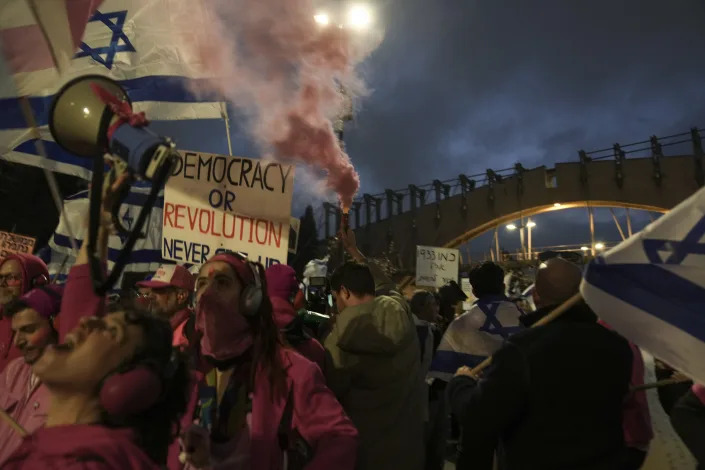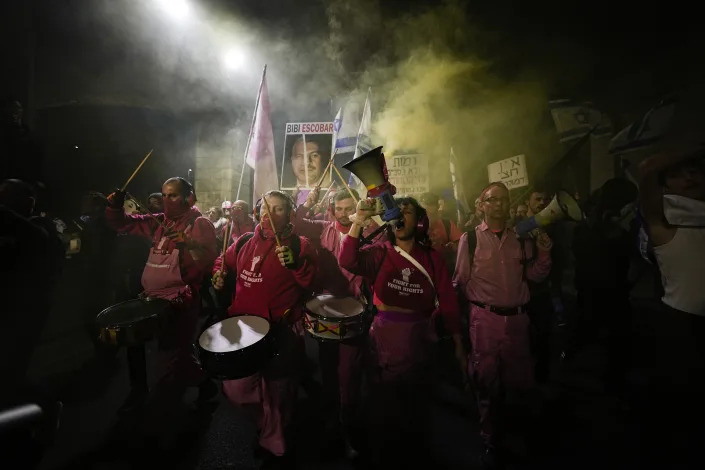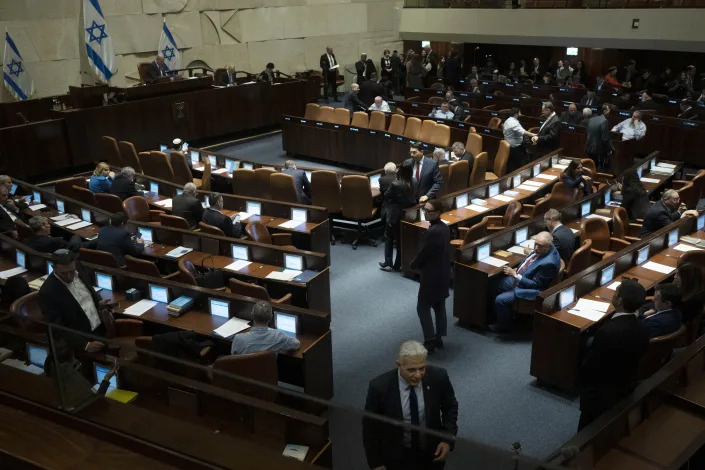Israel president urges consensus after judicial changes pass


ILAN BEN ZION
Tue, February 21, 2023 at 3:38 AM MST·5 min read
JERUSALEM (AP) — Israel's president Tuesday called on Prime Minister Benjamin Netanyahu’s coalition to seek dialogue and compromise after it pushed ahead with a controversial judicial overhaul in a turbulent parliamentary session overnight.
Isaac Herzog said it was a “difficult morning” following the late-night parliamentary vote that saw two contentious pieces of legislation pass a preliminary hurdle.
The legislation is part of sweeping changes proposed by the government that have prompted vocal criticism in Israel and abroad, drawn tens of thousands of protesters to the streets and spooked investors and financial markets.
On Tuesday, the dollar gained over 2% against the shekel, continuing a monthlong slide that has seen the Israeli currency lose over 5% of its value against the dollar. Several Israeli companies have said they are withdrawing money from the country, while Israeli newspapers have reported even larger withdrawals of cash as investors have grown jittery about the business climate.
Critics say the judicial overhaul underway will concentrate power in the hands of the ruling coalition in Israel's parliament, the Knesset, and erode the democratic system of checks and balances.
Netanyahu and his allies insist the changes will better curb an overly powerful Supreme Court.
"Many citizens across Israeli society, many people who voted for the coalition, are fearful for national unity,” Herzog said at a conference organized by the Yedioth Ahronoth newspaper. He urged Netanyahu and his allies to enable dialogue to reach a consensus on judiciary reform.
Late on Tuesday, Netanyahu issued an appeal for dialogue, saying he believed that the gaps could be reduced or closed. “Let's talk, here and now, without preconditions or excuses, so together we can achieve a broad agreement for the good of all citizens of Israel,” he said.
His critics have called on Netanyahu to freeze the legislation and start negotiations. Opposition leader Yair Lapid mocked the premier's appeal.
“Citizens of Israel, I have no pleasant way to say this: Prime Minister Netanyahu is lying,” Lapid said in a statement. “We have been trying to hold talks with them for many weeks.”
Herzog's remarks came the morning after tens of thousands of Israelis protested outside the parliament ahead of the vote, the second mass demonstration in Jerusalem in recent weeks.
Israeli Palestinians, a minority that may have the most to lose by the overhaul, have mostly stayed on the sidelines, due to discrimination they face at home and Israel’s ongoing 55-year occupation of their Palestinian brethren in the West Bank.
After more than seven hours of debate that dragged on after midnight, Netanyahu and his allies passed two clauses in the package of proposed changes that seek to weaken the country's Supreme Court and further empower ruling parliamentary coalitions.
With a 63-47 vote, the Knesset approved measures that give the governing coalition control over judicial appointments and curtail the Supreme Court’s ability to review the legality of major legislation known as “Basic Laws.” The bills still require two additional readings in parliament to pass into law.
Also planned are proposals that would give the parliament the power to overturn Supreme Court rulings and control the appointment of government legal advisers. The advisers currently are professional civil servants and critics say the new system would politicize government ministries.
The United States has called for restraint, and on Tuesday, the United Nations human rights chief called on Israel “to pause the proposed legislative changes and open them up for wider debate and reflection.”
"Such issues at the heart of rule of law deserve the fullest consideration in order to ensure that any changes promote, rather than diminish, the ability of the judiciary — and other branches of Government — to protect the rights of all people in Israel,” Volker Türk, the U.N.'s high commissioner for human rights, said in a statement.
German Justice Minister Marco Buschmann appeared to express concerns about the Israeli plan after a two-day visit that included a meeting with the overhaul’s architect, Justice Minister Yariv Levin, and two of the people targeted by the changes, Attorney General Gali Baharav-Miara and Supreme Court President Esther Hayut.
It is “clear for me that we must fundamentally protect and strengthen the institutions of our liberal democracies,” Bushmann said in a statement, “because fundamental rights are, by their nature, minority rights and the majority must never have the last word.”
According to a survey by the Israel Democracy Institute think tank published Tuesday, 66% of respondents think the Supreme Court should have the authority to strike down laws incompatible with the Basic Laws, and 63% think the current system for picking judges — a panel made up of politicians, judges and attorneys — should be maintained.
Almost three-quarters of the 756 respondents — 72% — said there should be compromise between the opposing political camps about proposed judicial changes.
Herzog, who serves as the largely symbolic head of state, has tried to broker dialogue between the increasingly polarized camps and has called on Netanyahu and his allies to delay the contentious judicial overhaul.
Netanyahu's governing coalition is made up of ultranationalist and ultra-Orthodox parties and took office in late December, after the country's fifth parliamentary elections in less than four years. The political deadlock was largely over the long-time leader's fitness to serve as prime minister while on trial for fraud, breach of trust and accepting bribes, charges Netanyahu has denied.
___
Associated Press writer Laurie Kellman contributed from Tel Aviv, Israel.
SEE
Israeli government advances judicial overhaul despite uproar


2 / 22


2 / 22
Israelis protest against plans by Prime Minister Benjamin Netanyahu's new government to overhaul the judicial system, near the Knesset, Israel's parliament in Jerusalem, Monday, Feb. 20, 2023. Israel's government is pressing ahead with its contentious plan to overhaul the country's legal system. A vote in parliament on Monday is due despite an unprecedented uproar that has included mass demonstrations, warnings from military and business leaders and calls for restraint from the U.S.
(AP Photo/Ohad Zwigenberg)
LAURIE KELLMAN and ILAN BEN ZION
Sun, February 19, 2023
JERUSALEM (AP) — Prime Minister Benjamin Netanyahu’s government on Tuesday for the first time advanced a plan to overhaul the country’s legal system, defying a mass uproar among Israelis and calls for restraint from the United States.
The vote marked only preliminary approval for the plan. But it raised the stakes in a political battle that drew tens of thousands of protesters into the streets, sparked criticism from influential sectors of society and widened the rifts in an already polarized country.
The 63-47 vote after midnight gave initial approval to a plan that would give Netanyahu’s coalition more power over who becomes a judge. It is part of a broader package of changes that seeks to weaken the country’s Supreme Court and transfer more power to the ruling coalition.
Netanyahu’s ultrareligious and ultranationalist allies say these changes are needed to rein in the powers of an unelected judiciary. Critics fear that judges will be appointed based on their loyalty to the government or prime minister — and say that Netanyahu, who faces trial on corruption charges, has a conflict of interest in the legislation.
The showdown has plunged Israel into one of its most bitter domestic crises, with both sides insisting that the future of democracy is at stake in their Middle Eastern country. Israeli Palestinians, a minority that may have the most to lose by the overhaul, have mostly stayed on the sidelines, due to discrimination they face at home and Israel’s ongoing 55-year occupation of their Palestinian brethren in the West Bank.
The legislators cast their votes after a vitrolic debate that dragged on past midnight. During the session, opposition lawmakers chanted, “shame,” and wrapped themselves in the Israeli flag — and some were ejected from the hall.
Thousands were rallying outside the Knesset, waving Israeli flags and holding signs reading “saving democracy!” Earlier in the day, protesters launched a sit-down demonstration at the entrance of the homes of some coalition lawmakers and briefly halted traffic on Tel Aviv’s main highway.
Netanyahu accused the demonstrators of violence and said they were ignoring the will of the people who voted his coalition into power last November.
“The people exercised their right to vote in the elections and the people’s representatives will exercise their right to vote here in Israel’s Knesset. It’s called democracy,” Netanyahu said, though he left the door open for dialogue on the planned changes.
The vote on part of the legislation is just the first of three readings required for parliamentary approval, a process that is expected to take months.
Nonetheless, the opposition, including tens of thousands of protesters in front of the Knesset in Jerusalem and in Tel Aviv, saw Monday’s vote as the coalition’s determination to barrel ahead.
“We are fighting for our children’s future, for our country’s future. We don’t intend to give up,” said opposition leader Yair Lapid.
Israel’s figurehead president has urged the government to freeze the legislation and seek a compromise with the opposition, a position supported by most polls.
Leaders in the booming tech sector have warned that weakening the judiciary could drive away investors.
The overhaul has prompted otherwise stoic former security chiefs to speak out, and even warn of civil war. The plan has even sparked rare warnings from the U.S., Israel’s chief international ally.
U.S. Ambassador Tom Nides told a podcast over the weekend that Israel should “pump the brakes” on the legislation and seek a consensus on reform that would protect Israel’s democratic institutions.
His comments drew angry responses from Netanyahu allies, telling Nides to stay out of Israel’s internal affairs.
The debate raged Monday from the floor of the Knesset to flag-waving demonstrations in Jerusalem and Tel Aviv.
Simcha Rothman, a far-right lawmaker leading the legislative initiative, presented the proposal to the parliament. Overhead in the viewing gallery, a spectator banged on the protective glass and was carried away by guards.
A fellow Religious Zionism party politician posted a photo on Twitter with Rothman ahead of the vote, celebrating with whisky and sushi.
Last week, some 100,000 people demonstrated outside the Knesset as a committee granted initial approval to the plan. On Monday, the crowds returned, waved Israeli flags, blew horns, and held signs reading “saving democracy.”
“All the steps that are going to take place now in the Knesset will change us to a pure dictatorship,” said Itan Gur Aryeh, a 74-year-old retiree. “All the power will be with the government, with the head of the government and we’ll all be without rights.”
Earlier in the day, protesters launched a sit-down demonstration at the entrance of the homes of some coalition lawmakers and briefly halted traffic on Tel Aviv’s main highway. Hundreds waved Israeli flags in the seaside city and further up the coast in Haifa, holding signs reading “resistance is mandatory.”
While Israel has long boasted of its democratic credentials, critics say that claim is tainted by the country’s West Bank occupation and the treatment of its own Palestinian minority.
Israel’s Palestinian citizens, who make up about 20% of the population, have the right to vote but continue to suffer discrimination in areas like the job and housing markets. In the West Bank, Jewish settlers can vote in Israeli elections and are generally protected by Israeli laws, while Palestinians in the same territory are subject to military rule and cannot vote.
The parliamentary votes seek to grant the ruling coalition more power over who becomes a judge. Today, a selection committee is made up of politicians, judges and lawyers — a system that proponents say promotes consensus.
The new system would give coalition lawmakers control over the appointments. Critics fear that judges will be appointed based on their loyalty to the government or prime minister.
A second change approved Monday would bar the Supreme Court from overturning what are known as “Basic Laws,” pieces of legislation that stand in for a constitution, which Israel does not have. Critics say that legislators will be able to dub any law a Basic Law, removing judicial oversight over controversial legislation.
Also planned are proposals that would give parliament the power to overturn Supreme Court rulings and control the appointment of government legal advisers. The advisers currently are professional civil servants, and critics say the new system would politicize government ministries.
Critics also fear the overhaul will grant Netanyahu an escape route from his legal woes. Netanyahu has been on trial for nearly three years for charges of accepting bribes, fraud and breach of trust. He denies wrongdoing and says he is the victim of a biased judicial system on a witch hunt against him.
Israel’s attorney general has barred Netanyahu from any involvement in the overhaul, saying his legal troubles create a conflict of interest. Instead, his justice minister, a close confidant, is leading the charge.
On Sunday, Netanyahu called the restrictions on him “patently ridiculous.”
___
Kellman reported from Tel Aviv, Israel.
LAURIE KELLMAN and ILAN BEN ZION
Sun, February 19, 2023
JERUSALEM (AP) — Prime Minister Benjamin Netanyahu’s government on Tuesday for the first time advanced a plan to overhaul the country’s legal system, defying a mass uproar among Israelis and calls for restraint from the United States.
The vote marked only preliminary approval for the plan. But it raised the stakes in a political battle that drew tens of thousands of protesters into the streets, sparked criticism from influential sectors of society and widened the rifts in an already polarized country.
The 63-47 vote after midnight gave initial approval to a plan that would give Netanyahu’s coalition more power over who becomes a judge. It is part of a broader package of changes that seeks to weaken the country’s Supreme Court and transfer more power to the ruling coalition.
Netanyahu’s ultrareligious and ultranationalist allies say these changes are needed to rein in the powers of an unelected judiciary. Critics fear that judges will be appointed based on their loyalty to the government or prime minister — and say that Netanyahu, who faces trial on corruption charges, has a conflict of interest in the legislation.
The showdown has plunged Israel into one of its most bitter domestic crises, with both sides insisting that the future of democracy is at stake in their Middle Eastern country. Israeli Palestinians, a minority that may have the most to lose by the overhaul, have mostly stayed on the sidelines, due to discrimination they face at home and Israel’s ongoing 55-year occupation of their Palestinian brethren in the West Bank.
The legislators cast their votes after a vitrolic debate that dragged on past midnight. During the session, opposition lawmakers chanted, “shame,” and wrapped themselves in the Israeli flag — and some were ejected from the hall.
Thousands were rallying outside the Knesset, waving Israeli flags and holding signs reading “saving democracy!” Earlier in the day, protesters launched a sit-down demonstration at the entrance of the homes of some coalition lawmakers and briefly halted traffic on Tel Aviv’s main highway.
Netanyahu accused the demonstrators of violence and said they were ignoring the will of the people who voted his coalition into power last November.
“The people exercised their right to vote in the elections and the people’s representatives will exercise their right to vote here in Israel’s Knesset. It’s called democracy,” Netanyahu said, though he left the door open for dialogue on the planned changes.
The vote on part of the legislation is just the first of three readings required for parliamentary approval, a process that is expected to take months.
Nonetheless, the opposition, including tens of thousands of protesters in front of the Knesset in Jerusalem and in Tel Aviv, saw Monday’s vote as the coalition’s determination to barrel ahead.
“We are fighting for our children’s future, for our country’s future. We don’t intend to give up,” said opposition leader Yair Lapid.
Israel’s figurehead president has urged the government to freeze the legislation and seek a compromise with the opposition, a position supported by most polls.
Leaders in the booming tech sector have warned that weakening the judiciary could drive away investors.
The overhaul has prompted otherwise stoic former security chiefs to speak out, and even warn of civil war. The plan has even sparked rare warnings from the U.S., Israel’s chief international ally.
U.S. Ambassador Tom Nides told a podcast over the weekend that Israel should “pump the brakes” on the legislation and seek a consensus on reform that would protect Israel’s democratic institutions.
His comments drew angry responses from Netanyahu allies, telling Nides to stay out of Israel’s internal affairs.
The debate raged Monday from the floor of the Knesset to flag-waving demonstrations in Jerusalem and Tel Aviv.
Simcha Rothman, a far-right lawmaker leading the legislative initiative, presented the proposal to the parliament. Overhead in the viewing gallery, a spectator banged on the protective glass and was carried away by guards.
A fellow Religious Zionism party politician posted a photo on Twitter with Rothman ahead of the vote, celebrating with whisky and sushi.
Last week, some 100,000 people demonstrated outside the Knesset as a committee granted initial approval to the plan. On Monday, the crowds returned, waved Israeli flags, blew horns, and held signs reading “saving democracy.”
“All the steps that are going to take place now in the Knesset will change us to a pure dictatorship,” said Itan Gur Aryeh, a 74-year-old retiree. “All the power will be with the government, with the head of the government and we’ll all be without rights.”
Earlier in the day, protesters launched a sit-down demonstration at the entrance of the homes of some coalition lawmakers and briefly halted traffic on Tel Aviv’s main highway. Hundreds waved Israeli flags in the seaside city and further up the coast in Haifa, holding signs reading “resistance is mandatory.”
While Israel has long boasted of its democratic credentials, critics say that claim is tainted by the country’s West Bank occupation and the treatment of its own Palestinian minority.
Israel’s Palestinian citizens, who make up about 20% of the population, have the right to vote but continue to suffer discrimination in areas like the job and housing markets. In the West Bank, Jewish settlers can vote in Israeli elections and are generally protected by Israeli laws, while Palestinians in the same territory are subject to military rule and cannot vote.
The parliamentary votes seek to grant the ruling coalition more power over who becomes a judge. Today, a selection committee is made up of politicians, judges and lawyers — a system that proponents say promotes consensus.
The new system would give coalition lawmakers control over the appointments. Critics fear that judges will be appointed based on their loyalty to the government or prime minister.
A second change approved Monday would bar the Supreme Court from overturning what are known as “Basic Laws,” pieces of legislation that stand in for a constitution, which Israel does not have. Critics say that legislators will be able to dub any law a Basic Law, removing judicial oversight over controversial legislation.
Also planned are proposals that would give parliament the power to overturn Supreme Court rulings and control the appointment of government legal advisers. The advisers currently are professional civil servants, and critics say the new system would politicize government ministries.
Critics also fear the overhaul will grant Netanyahu an escape route from his legal woes. Netanyahu has been on trial for nearly three years for charges of accepting bribes, fraud and breach of trust. He denies wrongdoing and says he is the victim of a biased judicial system on a witch hunt against him.
Israel’s attorney general has barred Netanyahu from any involvement in the overhaul, saying his legal troubles create a conflict of interest. Instead, his justice minister, a close confidant, is leading the charge.
On Sunday, Netanyahu called the restrictions on him “patently ridiculous.”
___
Kellman reported from Tel Aviv, Israel.
No comments:
Post a Comment